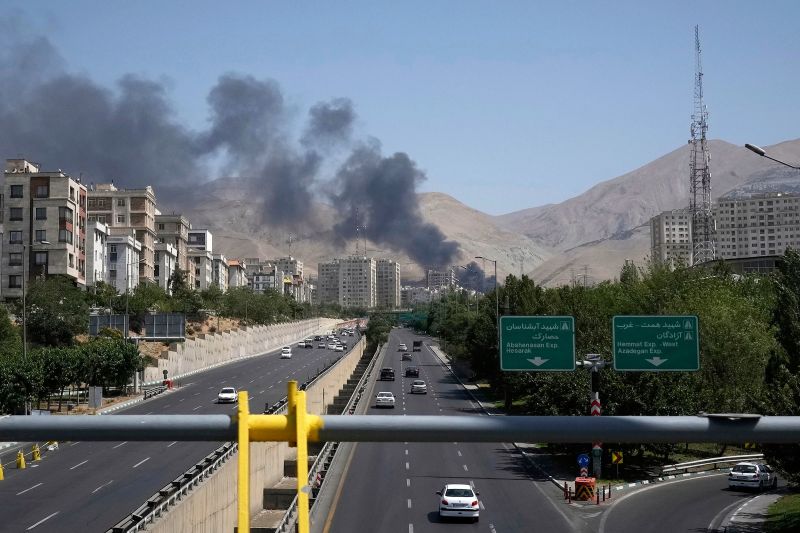
After 19 months of pounding Gaza, Israel is now under growing pressure from unlikely quarters – some of its closest Western allies.
Their patience has worn thin over Israel’s decision to expand the war and, in the words of one Israeli minister, “conquer” the territory – a move paired with plans to forcibly displace Gaza’s entire population to the south and block all humanitarian aid for 11 weeks.
The United Kingdom has paused trade talks and sanctioned extremist settlers in the West Bank. Canada and France have threatened sanctions. And the European Union – Israel’s biggest trade partner – is reviewing its landmark Association Agreement with the country.
Aid groups have warned that the situation in Gaza is becoming catastrophic, with the United Nations’ humanitarian chief Tom Fletcher last week calling on the world to “act decisively to prevent genocide.”
Dozens of babies have died of malnutrition, according to Gaza’s health ministry, and more than 53,000 people – or 4% of the entire population – have been killed since Israel launched its war following the October 7 terror attacks by Hamas and its allies.
The fact that some of Israel’s closest allies are now pushing back more vocally marks a major shift in attitudes toward the country.
The agreement, which covers various forms of cooperation between the two parties, including the free movement of goods and scientific collaboration, has been in place for 25 years. “The mere fact that this is being discussed seriously today is a sign of not just the increasing frustration, and I think also, let’s be quite clear, anger, in some European capitals over Israeli actions in Gaza,” said Lovatt.
The punitive steps threatened by the EU and other allies are designed in part to sway the domestic debate inside Israel, where society is already extremely divided over the war.
The government, propped up by hardliners from far-right parties, is determined to keep fighting in Gaza. But hundreds of thousands of Israelis demonstrate against the war each week, demanding the government agrees a ceasefire deal to release all the hostages still held in the strip.
In an opinion poll published by Israel’s Channel 12 broadcaster earlier this month, 61% of those surveyed favored ending the war for a deal that secures the hostage release, while only 25% supported the expanded military operation.
That notwithstanding, Arie Reich, a legal scholar at Israel’s Bar-Ilan University who specializes in international trade and EU law, said that external pressure on Netanyahu’s government may not have the desired effect.
“When foreign countries try to interfere in internal matters of another country, especially things that are very dear to them, such as their national security, it usually works as a boomerang, and it actually causes the people to support the government even more,” he said.
“There is a wide consensus in Israel that we want to release our hostages, and that we do not want to go back to where we were on October 6. We don’t want to have this threat of Hamas lingering over us,” Reich said.
But he added that the moves by some of Israel’s allies have made it clear that the “window of using military force is starting to close.”
“And maybe, if it goes on longer than that, I think it’s going to be very hard to maintain normal relations with many countries in the West,” he said.
Israel has so far brushed aside the threats from its Western allies. Prime Minister Benjamin Netanyahu has accused them of “offering a huge prize” to the October 7 attackers, while Israel’s foreign ministry said that “external pressure will not divert Israel from its path in the fight for its existence and security against enemies seeking its destruction.”
This determination to continue may be due to Netanyahu believing that he can, for now at least, rely on the United States for support.
And while the moves are diplomatically symbolic, critics expect little to change on the ground for Palestinians.
Short of a total arms embargo and a full suspension of economic relations, Israel is unlikely to change its ways, he said, arguing that Canada, France and the UK had been “complicit” in Israel’s actions in Gaza by providing it with “military, intelligence, economic, and diplomatic support.”
All three countries have longstanding agreements with Israel that include defense and security cooperation, although the detail of what exactly these contain is unclear.
The UK and France have suspended some arms licenses to Israel over the situation in Gaza but have continued to export military equipment worth tens of millions of dollars to Israel. Canada has said that no export permits on military goods to Israel have been issued since January 8, 2024.
Israel’s most powerful backer stands by it
As Israel’s most powerful ally, the US has the most sway over Netanyahu and his government. And while some in the Trump administration have criticized Israel over the dire humanitarian situation in Gaza, there has been no indication the US would take any punitive actions against it.
It isn’t, however, a “foregone conclusion that the US will continue to always unequivocally back Israel,” Lovatt said.
“While I don’t see a rupture in relations, clearly, the arrival of the second Trump administration has created an interesting dynamic, given the influence of what I would call the ‘America Firsters,’ those in the MAGA world who want to put the US first in everything, and that has, to a certain extent, also applied to Israel,” he said.
The US has moved out of step with Israel on number of issues in recent weeks.
It has struck a ceasefire deal with Yemen’s Iran-backed Houthi rebels without first informing Israel; unilaterally negotiated with Hamas the release of US citizen Edan Alexander from Gaza; and, according to a Reuters report, has dropped its demand for Saudi Arabia to normalize relations with Israel as a condition for US investment and potential US arms deals.
Addressing Israel’s criticism over the deal with the Houthis, US ambassador to Israel Mike Huckabee told Israeli media that the US “isn’t required to get permission from Israel” to get an agreement that protects its ships.
“Netanyahu has positioned himself as a master of the US political game, and as someone who’s best placed to manage and maintain tight Israel relations and to keep any US presidential administration on side. I think seeing some daylight between the Trump administration and the Israeli government clearly puts pressure on Netanyahu,” Lovatt said.
There are signs that some in Israel are worried about the consequences of its actions in Gaza. The leader of Israel’s opposition left-wing Democrats party, retired Israeli general Yair Golan, warned on Tuesday that Israel is “on its way to becoming a pariah state.”
The impact of the pressure from the allies was on display on Sunday, when the Israeli military announced it would allow a “basic amount of food” to enter Gaza as it launched its new offensive in the strip, which Israel says is intended to pressure Hamas to release the hostages held there.
Netanyahu conceded on Monday that if “a situation of famine” arose in Gaza, Israel “simply won’t receive international support.”
In a statement posted to Telegram, he added that even US senators “who have been staunch, unconditional supporters of Israel for decades” had told him that “images of mass starvation” in Gaza would cost Israel their support.
‘More of a threat’
Even if the US won’t use its leverage to force Israel to change its strategy in Gaza in a more significant way, it doesn’t mean Europe can’t put pressure on Israel on its own, experts say.
The European Union is Israel’s biggest trading partner, accounting for roughly a third of its trade in goods.
A full suspension of the Association Agreement between the EU and Israel is unlikely, as it would require unanimous agreement of all 27 EU member states and several have already indicated they would not support it – including Hungary, a staunch supporter of Israel.
Reich said that under the terms of the agreement, both the EU and Israel can terminate it for whatever reason, or even without giving a reason.
“The thing is that within the EU, that would require consensus … and that would be very, very hard, because there are many countries, many (EU) member states that will not go along with this,” he said.
“So I think it’s more of a threat to put pressure (on Israel) and maybe they could manage some temporary suspension of some provisions, but to terminate it, I don’t think it can happen,” he added.
Public support for the country runs deep in many of the bloc’s member states, which makes it difficult for some European governments to push for harsher sanctions against Israel.
And, Lovatt said, many European countries are also aware of the fact that they may need Israel’s help in the future.
“Especially in a situation where European countries are increasingly fearful of Russia’s actions in Ukraine, but also the threat that Russia represents the rest of Europe, and (they) see Israel as an important source of weapons and technology,” he said.
While terminating the association agreement would require unanimity, it would only take a majority of EU states to force through a partial suspension of the agreement.
Even that could be painful for Israel because it could lead to higher tariffs on Israeli products or prevent Israel from taking part in coveted EU projects such as the Horizon Europe program, with more than $100 billion in funding available for research and innovation.
The EU has in the past used its power to put pressure on countries over human rights abuses – often for issues Lovatt says are a lot less serious than the current situation in Gaza.
“The bottom line is that until now, the EU has treated Israel with a degree of exceptionalism by not taking anywhere near the sort of steps that it has taken in other situations of human rights abuses or territorial annexation,” Lovatt said.










